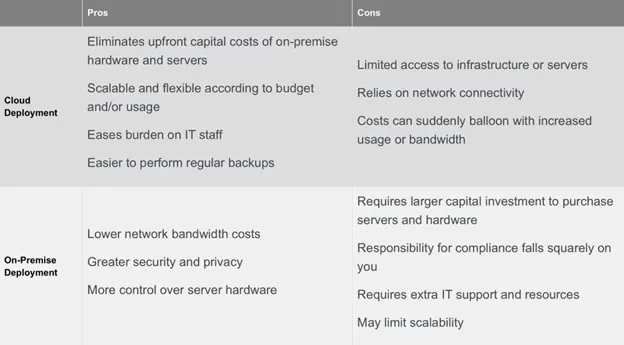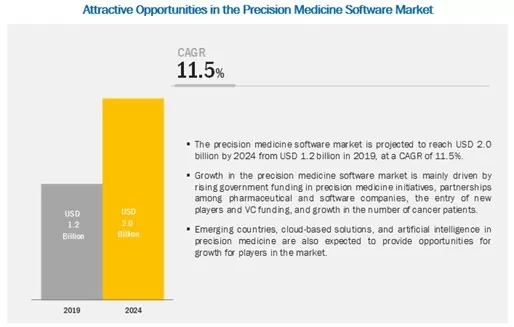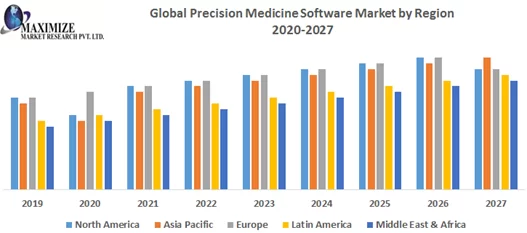In the digitalized world of personalized music, videos, and shopping lists, shouldn’t we also head towards a personalized healthcare system?
If you are dreaming of accessible and effective apps to monitor your health and diagnose your disease with incredible precision, you are about to find out that the future is now. Read the article about precision medicine software and learn about this new approach towards healthcare.
What Is Precision Medicine
Precision Medicine is a newly emerging type of medicine that operates on an individual’s genetic modeling, lifestyle, and environment. This means, you, as an individual, can get a genetic test, which is later applied to a precision medicine app; you can fill in your lifestyle data, which is uploaded to the same app, and finally based on your geographic location, the app accesses environmental factors of yours.
The aforementioned information contributes to more precise diagnosis and better treatment. With your genetic modeling in the app, professionals, aka doctors, can better foresee any mutations or responses to treatments, thanks to which you will experience less side effects.
Medical data deployment is generally divided into cloud-based and on-premise deployment, the latter being the bigger part of medical data hosting.
Let’s see precision medicine apps by deployment mode:
On-premise Deployment
On-premise deployment means you purchase servers and routers necessary to host your data. This solution is very secure and provides unlimited access to the servers. Nevertheless, the upfront costs of the servers, and IT staff to maintain it, makes the on-premise deployment significantly more expensive than cloud-based deployment.
Cloud-based Deployment
Cloud-based deployment means you rent an internet space from a third party, and store your data on remote servers. This solution is convenient as it has no upfront costs and requires no additional staff to maintain hardware. In contrast to on-premise deployment owners, the cloud one has limited access to their data and may encounter security bridges or unwanted data accesses.

Source: https://www.cometchat.com
Precision Medicine Software – Market Overview
Experts estimate that the growth of Precision Medicine Software may reach 2.0 billion USD in 2024. This growth is due to the improved partnership among pharmaceutical and medicine software markets, as well as government funding for precision medicine initiatives.
Sadly, security risks, which result in higher deployment and maintenance costs, as well as non-refundable genetics tests, and death of IT healthcare professionals restrain the precision medicine market growth.
Key Players
North America is the largest precision medicine software player, with Synapse Inc. (USA), Foundation Medicine Inc. (USA), PierianDx, Inc (USA), and many others.
Synapse is the biggest player on the US precision medicine software market. They adopted a strategy of growth through app launches, collaboration, and expansion to Asia and Middle East.
Synapse has established collaboration with several US healthcare organizations, such as Medidata, Roche Pharmaceuticals, etc. With vast data exchange and an innovative approach, Synapse maintains a fresh eye on precision medicine software.
2bPrecise (Israel) is the major international market player. Their strategy focuses on agreements and collaborations with other healthcare units.
In 2017, the company established cooperation with Mayo Clinic, which led to the improvement of tools used to measure outcomes in patients with genetic cardiovascular disease.
Philips N.V. (Netherlands) is one of the biggest precision software medicine market players in Europe. Their strategy also drifts towards cooperation and support of Healthcare units, especially those dealing with cancer treatment.
Still, they maintain an innovative and competitive approach that is aimed at incorporating new ideas or processes on top of already existing solutions.
Statistics
As mentioned before, precision medicine software is growing, with its 11.5% CAGR, largely thanks to government funding, innovative software projects and cloud-based solutions from countries all over the world.

Source: https://www.marketsandmarkets.com
Globally, the precision medicine software market is also growing. Experts predict that Asia will take the lead in software development and innovations.
In 2019, the oncology segment held the largest share of the market. Yet, in 2022 Universities started promoting partnerships with IT start-up companies dedicated to precision medicine software. Hence, other segments of healthcare may flourish soon.

Source: https://www.maximizemarketresearch.com
Precision Medicine Software – Market Drivers
Innovations and New Launches
Global development in bioinformatics, molecular strategy and genomic tools are powerful drives in precision medicine software.
In January 2019, XIFIN launched their new bioinformatics platform to help healthcare professionals gain insight, make decisions, and improve patient care outcome.
In the field of molecular strategy, in April 2018, Harward’s Wyss Institute launched its new tool – NuProbe – which is a DNA testing tool for faster, cheaper and more accurate molecular diagnosis.
Ariel Precision Medicine Inc. launched a genomic tool called Ariel Dx. The product was designed to improve personal management and early diagnosis of pancreatic diseases.
AI contribution to health technology
We have certainly witnessed the outbreak of machine learning and Artificial Intelligence over the past decade. Along with many fantasy books and movies, AI has been making a career in the health department as well. In a survey conducted in 2021, 82% of healthcare organizations answered that they would like to adopt AI technology in their units.
Another survey shows that 3 out of 4 healthcare organizations will be increasing their AI funding in the upcoming years.
One of the key specs of AI in precision medicine software is Electronic Health Records. AI is now able to hold and analyze vast data of medical records. Hence, it can recognize anomalies in new patients and connect them to already existing ones, which makes treatment more accurate and reaction much faster. The AI database is also used for the education of young doctors and medical students.
Precision Medicine Software – Restrictions
As much as the discussed automatization of healthcare products may seem like a golden mean, it, unfortunately, comes with a price.
Cybersecurity
One of the most obvious challenges to precision medicine software is cybersecurity.
Servers hosting medical data are under constant threat, which is why the US healthcare sector spends approximately $5.6 billion per year to prevent data breaches.
Other cyber threats are phishing attacks, user identification deficiencies, excessive user permissions, misleading websites, and cloud threats.
Data Processing
Processing and analyzing medical data requires advanced Artificial Intelligence. The data has to be gathered and synchronized into a user-friendly software which is applicable in clinics. Data processing must need the challenges of collecting, sorting, updating and visualizing the healthcare data.
Wrap Up
Precision medicine software is a newly emerging healthcare skim which is aimed at more personal and accurate data analysis. This type of medical software gathers personal health records of an individual. In consequence, healthcare apps can better recognize mutation of an individual genome, and propose more accurate treatment. In the bigger picture, precision medicine software compares individual health records of all users and detects similarities in-between cases. This makes precision medicine faster in disease diagnosis and more efficient with treating it.
Precision medicine software market is augmented by a couple of powerful drivers:
- Innovations and new launches. Beginning in 2018, healthcare giants such as XIFIN, Harward’s Wyss Institute, and Ariel Precision Medicine Inc. have launched their new tools for bioinformatics platform, molecular strategy, and genomic analysis respectively.
- Government funding and collaboration with the pharmaceutical market. Key player in precision medicine software – Synapse Inc. – adopted a very collaborative approach to precision medicine software. It established cooperation with several US Healthcare organizations, and are planning to expand to Asia and Middle East.
The market being worth 2.0 billion dollars still has some obstacles to overcome:
- Cybersecurity – sensitive user data is constantly under breach attempts, hence, the maintenance and protection of servers is very costly.
- Data processing – precision medicine software has to be able to process and analyze colossal amounts of images and other data in short time periods, while maintaining friendly user experience.
One of the most useful technologies propelling the growth of precision medicine software is Artificial Intelligence. 3 out of 4 healthcare organizations report the will to increase AI funding in the upcoming years, and 82% declare to already be using AI in their units. AI is able to analyze the vast amount of data and determine the most effective and personalized treatment plan. If you are interested in engaging with precision medicine software, you can find out more about Elinext heathTech software development.









